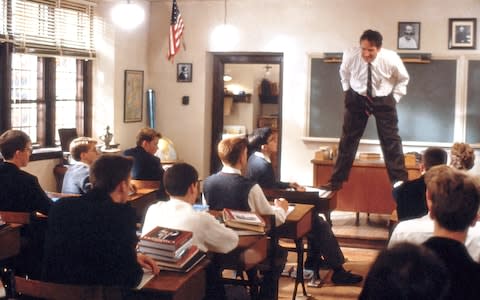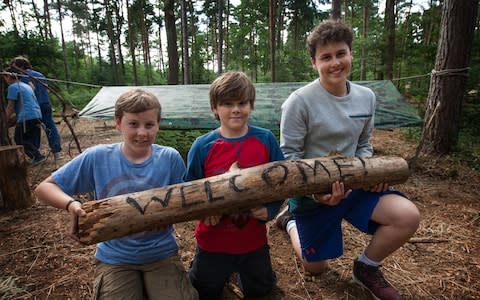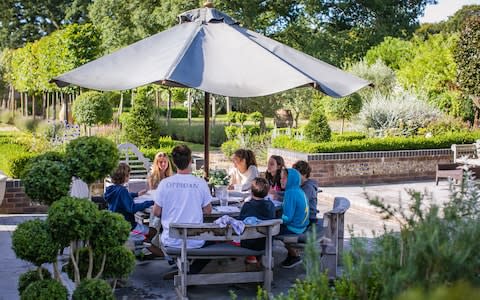Should you send your kids 'educamping' this summer?

On the final day of the educational summer camp he held in Wiltshire last summer, Henry Faber wandered through fields with a dozen of his young charges to the village store to buy postcards. He was more than a little surprised when the children then stuck their stamps in the middle of their cards.
“Technology has overtaken their lives,” says Faber, who last year launched Oppidan Education, which offers excellent term-time mentoring but also takes exam-weary prep-school children on mentored learning breaks to polish up the “soft skills and life values” often overlooked by today’s education system.
“That postcard incident taught me something else,” he adds. “I realised just how important summer camps are to help children go back to basics, to remind them what’s important, how to interact, and to recognise how they project themselves.”

With their stable of impressive mentors – all of whom went to top public schools and leading universities – Faber and his Oppidan co-founder Walter Kerr, both 25 (and graduates from Oxford and Durham respectively), will run six “mentored-learning” camps this summer.
While there have always been camps that teach the usual fire-making, burger-flipping and tying of knots, the Oppidan method is more Dead Poets Society, whereby a vibrant young graduate provides a small group of nine-to-14 year olds with an informal influence, and takes learning out of the classroom: improving children’s maths on a tennis court or analysing poetry on a boat. “Tutors can sometimes be bound to a desk,” says Faber, who is also an actor. “We like to infect them with our enthusiasm.”
Tutors can sometimes be bound to a desk. We like to infect kids with our enthusiasm
The aim remains to help and support children preparing for pre-tests, Common Entrance and public exams, but in a more rounded and “off-grid” way than traditional tutors, equipping them with vital soft skills – public speaking, debating, pitching a business idea, not to mention sending a postcard – at the same time.
Last year, they tried out their “invisible teaching” techniques at the prestigious (and family friendly) Peligoni Club in Zakynthos in Greece.

“I’d take five out on the baseline of the tennis court,” explains Kerr, “and give them questions relevant to their maths syllabus. For each right answer, they could take a step closer to the net, in order to get to play me at tennis and for them to take over as quizmaster. The idea of a student running a class, deciding and controlling what’s to be learned, was a novel concept for them. You’re reversing how learning usually happens, but it really works.”
So successful were their endeavours that, when the pair returned home from Greece, they invested in two Indian bell tents, which can each sleep ten children, booked a friend to do the cooking, and created several camps, including one in France and another in the garden at Faber’s mother’s Wiltshire home. Families can even book their own bespoke camps where they provide the setting and the children and OE goes to them. Including transport, teaching time and food, three-day camps cost from £450 per child.
It’s what we call ‘super-curricular’ work. We like going beyond what they’re learning at school
“In the mornings,” says Faber, “there are a carousel of workshops; anything from public speaking to pitching a business idea and debating. There are treasure hunts and photographic challenges. We tailor each camp for the time and place. If it’s the end of August, we focus on preparing them for starting school again – maybe creative writing, maths, a bit of science: we’ve taught about kinetic energy by firing rockets into the local village. It’s what we call ‘super-curricular’ work. We like going beyond what they’re learning at school.”

When it comes to educational camps to keep children busy – and learning – over the summer, it's not just Oppidan who have upped the ante since my three boys were at prep school.
At Rua Fiola, an adventure camp held on Oban, nine-to-15 year-olds get to swim with dolphins and learn how to survive a shipwreck. And Camp Wilderness, which operates in private woodlands in Oxfordshire, Hertfordshire, Cheshire and Kent, offers outdoor adventure geared to modern kids’ high expectations. Knot-tying and fire-building alone no longer cut the mustard. It is now shelter-building, trapping, butchery and plant identification.
Tech Camp, in Abingdon and Winchester among other locations, would have been ideal for my middle son, a sociable nerd. They learn to write computer programmes and make electronic devices to take home, like robots.
Role Models, launched in 2014 by Durham graduate Hugo Shephard, teaches soft skills including problem solving and team building.

However, among contemporary camps, Oppidan remains unique for its emphasis on enjoyable exam preparation. They hope soon to expand into doing camps for older children because, as Faber observes, there are different challenges with teenagers.
For the time being, they are returning to the Peligoni for half-term revision next week, and doing six 3-to-5 day camps this summer in various locations. Faber and Kerr are keen to keep things “small and cosy in beautiful settings, as opposed to becoming enormous and corporate”.
Here’s hoping the pair's vision and enthusiasm will convert into A-stars, as well as happy memories, for their charges.
• Oppidan Education (020 3409 3359)
This article was originally published in May 2017.

 Yahoo News
Yahoo News 